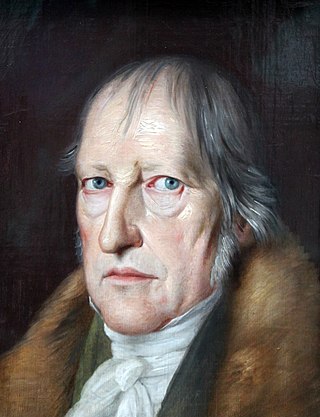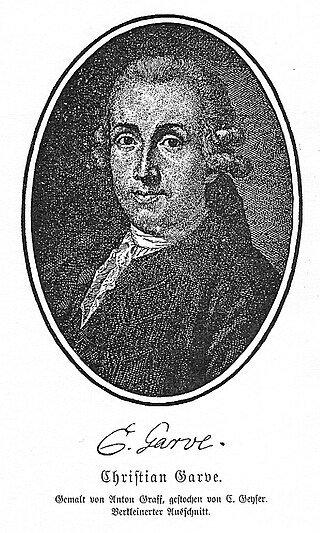Related Research Articles

Aristotle was an Ancient Greek philosopher and polymath. His writings cover a broad range of subjects spanning the natural sciences, philosophy, linguistics, economics, politics, psychology, and the arts. As the founder of the Peripatetic school of philosophy in the Lyceum in Athens, he began the wider Aristotelian tradition that followed, which set the groundwork for the development of modern science.
In ontology, the theory of categories concerns itself with the categories of being: the highest genera or kinds of entities. To investigate the categories of being, or simply categories, is to determine the most fundamental and the broadest classes of entities. A distinction between such categories, in making the categories or applying them, is called an ontological distinction. Various systems of categories have been proposed, they often include categories for substances, properties, relations, states of affairs or events. A representative question within the theory of categories might articulate itself, for example, in a query like, "Are universals prior to particulars?"

Georg Wilhelm Friedrich Hegel was a German philosopher and one of the most influential figures of German idealism and 19th-century philosophy. His influence extends across the entire range of contemporary philosophical topics, from metaphysical issues in epistemology and ontology, to political philosophy, the philosophy of history, philosophy of art, philosophy of religion, and the history of philosophy.

Immanuel Kant was a German philosopher and one of the central Enlightenment thinkers. Born in Königsberg, Kant's comprehensive and systematic works in epistemology, metaphysics, ethics, and aesthetics have made him one of the most influential and controversial figures in modern Western philosophy, being called the "father of modern ethics", the "father of modern aesthetics", and for bringing together rationalism and empiricism earned the title of "father of modern philosophy".
Reason is the capacity of applying logic consciously by drawing conclusions from new or existing information, with the aim of seeking the truth. It is associated with such characteristically human activities as philosophy, religion, science, language, mathematics, and art, and is normally considered to be a distinguishing ability possessed by humans. Reason is sometimes referred to as rationality.

Virtue ethics is an approach that treats virtue and character as the primary subjects of ethics, in contrast to other ethical systems that put consequences of voluntary acts, principles or rules of conduct, or obedience to divine authority in the primary role.

Aristotelianism is a philosophical tradition inspired by the work of Aristotle, usually characterized by deductive logic and an analytic inductive method in the study of natural philosophy and metaphysics. It covers the treatment of the social sciences under a system of natural law. It answers why-questions by a scheme of four causes, including purpose or teleology, and emphasizes virtue ethics. Aristotle and his school wrote tractates on physics, biology, metaphysics, logic, ethics, aesthetics, poetry, theatre, music, rhetoric, psychology, linguistics, economics, politics, and government. Any school of thought that takes one of Aristotle's distinctive positions as its starting point can be considered "Aristotelian" in the widest sense. This means that different Aristotelian theories may not have much in common as far as their actual content is concerned besides their shared reference to Aristotle.

The Critique of Pure Reason is a book by the German philosopher Immanuel Kant, in which the author seeks to determine the limits and scope of metaphysics. Also referred to as Kant's "First Critique", it was followed by his Critique of Practical Reason (1788) and Critique of Judgment (1790). In the preface to the first edition, Kant explains that by a "critique of pure reason" he means a critique "of the faculty of reason in general, in respect of all knowledge after which it may strive independently of all experience" and that he aims to decide on "the possibility or impossibility of metaphysics". The term "critique" is understood to mean a systematic analysis in this context, rather than the colloquial sense of the term.

The Critique of Practical Reason is the second of Immanuel Kant's three critiques, published in 1788. Hence, it is sometimes referred to as the "second critique". It follows on from Kant's first critique, the Critique of Pure Reason, and is one of his major works on moral philosophy. While Kant had already published one significant work in moral philosophy, the Groundwork of the Metaphysics of Morals (1785), the Critique of Practical Reason was intended to develop his account of the will as determinable by the moral law alone, place his ethical views within the larger framework of his system of critical philosophy, and expand on certain themes in his moral philosophy such as the feeling of respect for the moral law and the concept of the highest good.

Kantianism is the philosophy of Immanuel Kant, a German philosopher born in Königsberg, Prussia. The term Kantianism or Kantian is sometimes also used to describe contemporary positions in philosophy of mind, epistemology, and ethics.

Kaarlo Jaakko Juhani Hintikka was a Finnish philosopher and logician. Hintikka is regarded as the founder of formal epistemic logic and of game semantics for logic.
Jonathan Lear is an American philosopher and psychoanalyst. He is the John U. Nef Distinguished Service Professor in the Committee on Social Thought at the University of Chicago and served as the Roman Family Director of the Neubauer Collegium for Culture and Society from 2014 to 2022.
Practical philosophy concerns itself mainly with subjects that have applications in life, like the study of values, norms, politics, art, etc. The modern division of philosophy into theoretical philosophy and practical philosophy has its origin in Aristotle's categories of natural and moral philosophy. The one has theory for its object and the other practice.

Christian Garve was one of the best-known philosophers of the late Enlightenment along with Immanuel Kant and Moses Mendelssohn.
Metaphysics is the branch of philosophy that investigates principles of reality transcending those of any particular science. Cosmology and ontology are traditional branches of metaphysics. It is concerned with explaining the fundamental nature of being and the world. Someone who studies metaphysics can be called either a "metaphysician" or a "metaphysicist".
Western philosophy, the part of philosophical thought and work of the Western world. Historically, the term refers to the philosophical thinking of Western culture, beginning with the ancient Greek philosophy of the pre-Socratics. The word philosophy itself originated from the Ancient Greek philosophía (φιλοσοφία), literally, "the love of wisdom" Ancient Greek: φιλεῖν phileîn, "to love" and σοφία sophía, "wisdom".
Anioł Dowgird was a philosopher of Polish Enlightenment and Lithuanian Enlightenment.
Marco Sgarbi is an Italian philosopher and an historian of philosophy, with a special interest in the history of epistemology and logic. He is associate professor at the Ca' Foscari University of Venice. He is member of the Accademia Nazionale Virgiliana.
Transcendental humanism in philosophy considers humans as simultaneously the originator of meaning, and subject to a larger ultimate truth that exists beyond the human realm (transcendence). The philosophy suggests that the humanistic approach is guided by "accuracy, truth, discovery, and objectivity" that transcends or exists apart from subjectivity.
Jens Timmermann is a German philosopher and the Professor of Moral Philosophy at the University of St Andrews. He is best known for his research on Kant’s ethics, political philosophy and philosophy of law.
References
- 1 2 Immanuel Kant, Lectures on Ethics, Cambridge University Press, 2001, p. 41 ("On Universal Practical Philosophy"). Original text: Immanuel Kant, Kant’s Gesammelte Schriften, Band XXVII – Moralphilosophie, 1. Hälfte, 1974, p. 243.
- ↑ Albert Schwegler, A History of Philosophy in Epitome, D. Appleton, 1877, p. 312.
- ↑ Aristotle, Metaphysics , Book 1.
- ↑ Solvang, Lin (3 June 2015). "Theoretical Philosophy". mcc.ku.dk. Retrieved 31 January 2017.
- ↑ "Theoretical Philosophy - University of Helsinki". www.helsinki.fi. Retrieved 30 January 2017.
- ↑ "Theoretical Philosophy | Philosophisches Seminar - English". www.blogs.uni-mainz.de (in German). Retrieved 31 January 2017.
- ↑ "Theoretical Philosophy". Universiteit Utrecht. 5 December 2014. Retrieved 31 January 2017.
- ↑ "Theoretical Philosophy | Department of Philosophy, Lund University". www.fil.lu.se. Retrieved 30 January 2017.
- ↑ "Theoretical Philosophy | Philosophy". uwm.edu. Retrieved 31 January 2017.